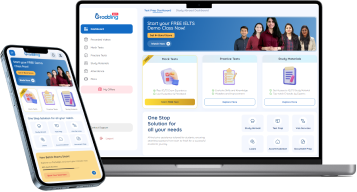The IELTS reading section is an important part of the IELTS exam, that is designed to evaluate a candidate’s reading comprehension skills. It has 40 questions in total, all need to be done within a 60-minute time limit. In addition, having a better understanding of this section is vital for scholars to score well on the exam. Many times, most of the students lose marks because of less preparation for the reading section. Thus, this blog covers the most useful and reliable IELTS reading tips which will help you to ace the IELTS exam on first attempt. So let’s dive in with the blog.

Table of Contents
In the IELTS exam, there are two types of reading tests these are IELTS Academic and IELTS General Training. The reading section questions for both these tests are generally the same, except for a minor difference.
This section will also test your skills, like reading for detail, understanding inferences, finding the author's opinions, skimming, and scanning.
Below are a few more details regarding the IELTS reading section:
1. You will get three passages with a total of 40 questions that you need to answer in 60 minutes.
2. In the IELTS Academic, you will get texts from books, journals, magazines, and newspapers. Whereas, in the IELTS general training, you will get passages from everyday materials like newspapers, advertisements, and handbooks.
3. There are also a variety of question types that you need to answer. Some of these types include multiple choice, short answer, true/false/not given, matching headings, and sentence completion.
4. Each of the 40 questions is worth 1 point, and depending on your raw IELTS score, you will get a band score of 0 to 9.
Above are the basic details regarding the IELTS reading section. However, you can check out our IELTS reading tips below to get your dream band score.
| IELTS Reading | Structure |
| Format | 3 reading passages, from easy to hard levelTaken from books, magazines, and newspapers1 hour to answer 40 questions |
| Questions | 40 questions, based on the given texts, in a range of formats.-Matching Headings-Matching Paragraph Information-Matching Features-Matching Sentence Endings-True, False, Not Given-Multiple Choice-List Selection-Choosing a Title-Short Answer Questions-Sentence Completion-Summary Completion-Table Completion-Flow Chart Completion-Diagram Label Completion |
Overall, this is the format and structure of the IELTS reading section. In the next section, we will talk briefly about the tips for the IELTS reading section that will help you enhance your score.
Must Read: IELTS Reading Question Types
To help you boost your preparation and performance in the IELTS, below are a few tips and tricks for IELTS reading. These will help you improve your reading skills, develop strategies to answer different types of questions, and enhance your band score.
To save time and find answers quickly in the IELTS reading section, you can try to identify the keywords first in the questions as well as the reading passage. At times, the wording is paraphrased in the questions and passages, so you will be able to pinpoint relevant sections and answers.
During your IELTS preparation, make sure that you solve enough of the reading passages using this tip. It will help you improve your targeted scanning, contextual understanding, paraphrase identification, and efficiency and time management during the real IELTS exam.
Another of the best reading tips for IELTS is skimming through the passage. This will help you get a quick overview of the entire passage while saving time and improving your overall comprehension.
Here, make sure that you focus on the key elements of the paragraph, such as titles and headings, along with the first and last sentences of the paragraphs. This way, you will be able to identify where the information is located, which will help you answer the question easily.
The next on our list of IELTS reading tips is to improve your Vocabulary. When you improve your Vocabulary, you will be able to understand texts clearly, accurately, and more efficiently.
That’s not it; having a high vocabulary will also help you in IELTS writing tasks 1 and 2. To improve your Vocabulary, you can try to read various texts on a wide variety of topics. Additionally, you can try to identify unfamiliar words and look them up in context to make them a part of your Vocabulary.
Improving your reading comprehension is another one of the great IELTS reading strategies that can help you get higher band scores and better test performance, and will even improve your confidence.
You can easily improve your reading comprehension for the IELTS reading section by practising different types of questions, building a higher vocabulary, and improving your reading speed. This will help you engage with the text actively, understand its structure, and develop your time management skills.
When you practice different types of IELTS questions, you will be able to familiarize yourself with the test format and develop other important skills. Developing these skills and strategies will help you answer these questions effectively during the exam.
In addition to that, it will also build your confidence and recognize patterns. To do this, you can start by identifying the question types, regularly taking IELTS reading test practice, and analysing the incorrect answers.
More often than not, the answers are generally right there in the paragraph. So, make sure that in the IELTS reading section, you first identify the keywords and questions and then scan the whole paragraph to find the corresponding information.
Finding information in the passage is a great tip to help you understand what specific information you need and how and where you can find it in the text.
Simple yet effective tips and tricks for IELTS reading include not worrying about understanding every word. If you get stuck and don’t understand a word in the IELTS reading test, then try to comprehend the sentences and words around it.
However, if you fail to do it, you can rather focus on the words that are related to the question. Your main focus should be on understanding the theme and the main information in the text. This is because the IELTS test is more about your ability to understand and comprehend things in English rather than about having a perfect vocabulary.
Practising with interesting texts is another of the best reading tips for the IELTS exam, as it can help you become comfortable with different writing styles, topics, and even question types.
To practice with interesting texts, you can try to explore magazines, newspapers, academic journals, online publications, and books on various topics. In addition to this, you can also try to take notes for new words and phrases, which can improve your understanding of the IELTS reading passages.
The last of our IELTS reading tips is to practice as much as you can. This might sound like a normal tip; however, it can make a big difference in getting a higher band score. While our tips for IELTS reading above can help you answer questions more precisely and save time, practising more and giving mock tests will help you identify your weak areas.
It can also help you develop effective IELTS reading strategies for finding answers efficiently, such as skimming, scanning, and paraphrasing.
These were some IELTS reading tips and tricks that can help you during your IELTS preparation as well as during the actual test. Below are some tips that you can follow for your IELTS exam day.
Below are some IELTS exam day tips that can ensure you are prepared and confident to maximize your performance on the test day. These final-day reading tips will help you understand question types and manage time effectively.
1. Make sure that you allocate enough time for each passage and question set so that you do not miss any questions.
2. You should also pay close attention to questions before reading the passage. This will guide your reading and help you understand what to look for.
3. Rather than focusing on the keywords, pay attention to understanding the main idea.
4. Make sure that you allocate time to review your answers. This will help in avoiding unnecessary mistakes.
5. Lastly, skimming and scanning techniques were used to locate the answers correctly.
Also Read: IELTS General Reading Score
In conclusion, knowing the right IELTS reading tips is an important part of our IELTS preparation that can help you improve your chances of scoring high in the exam. In our blog above, we talked about the top 10 IELTS reading tips and tricks, along with common mistakes that you should avoid.
However, if you are still confused and need expert help, then you can connect with our experts at Gradding.com. They will help you every step of the way and provide comprehensive resources for not only the IELTS reading section but for writing task 1 and IELTS writing task 2 as well. Connect with them today!
1. How to Solve IELTS Reading Easily?
To solve IELTS reading easily, you should practice active reading daily and focus on understanding passage structures. In addition to that, you can also highlight keywords, skim for main ideas, and scan for specific details.
2. How Can I Improve My Reading Score in IELTS?
The best way to improve your reading score in IELTS is by developing vocabulary, practising different question types, and timing yourself regularly to simulate exam conditions. You can also learn strategies for tackling True/False/Not Given and Matching tasks.
3. How Can I Get 8.5 In IELTS Reading?
To get an 8.5 in IELTS reading, make sure that you maintain accuracy under time pressure, avoid careless mistakes, and refine strategies like skimming, scanning, and paraphrasing to achieve high scores.
4. How Can I Get a 9 In IELTS Reading?
If you want to get a 9 in IELTS reading, you should aim for perfection by mastering advanced reading techniques, understanding question traps, and practising consistently with authentic IELTS materials.

We are available in :
BangaloreAhmedabadJaipurHyderabadKeralaPuneChandigarhMumbaiGurgaonChennaiKolkataTrivandrumNoidaKochiCalicutKottayamKollamThrissurIndoreUdaipurdisclaimer:logos and other registered trademarks of universities used on this platform are held by their respective owners. Gradding does not claim ownership or association on them, and their use is purely for informational and illustrative purposes.

